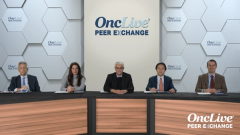
Novel Therapies and Treatment Selection in Patients With Relapsed/Refractory FL
Expert perspectives on novel approaches to treatment in the relapsed/refractory setting, particularly CAR T-cell therapy, for patients with follicular lymphoma.
Episodes in this series

Transcript:
Bijal D. Shah, MD, MS: Caron, we’ve got some really interesting drugs coming in the more advanced relapsed/refractory setting, a whole host of PI3K inhibitors, I think novel CD20 antibodies, even CAR T [chimeric antigen receptor T-cell therapy]. How are you making decisions about who to treat and with what?
Caron A. Jacobson, MD, MPH: Yes, this is a really tough discussion to have with patients. I think what’s been remarkable is that the PI3 kinases seem very consistent in terms of response rate, and complete response [CR] rate, and durable remission rate. But the duration of remission tends to be just about 1 year for these. Right now, of course, we have duvelisib, idelalisib, copanlisib, and umbralisib, but there are many others in clinical development.
We have also seen the approval of tazemetostat, the EZH2 inhibitor, in this disease for both EZH2 wild-type and EZH2-mutated disease. Certainly, the response rates are higher in EZH2-mutated disease, but the progression-free survival looks very similar in both groups. And it really does tell us that it’s working by a multitude of mechanisms.
Then, the last thing that was recently approved in this line of therapy is axicabtagene ciloleucel based on the ZUMA-5 study, which clearly showed the highest complete response rate, upward of about 80% for follicular lymphoma. And for patients who achieve a complete response, we saw the data presented at ASH [American Society of Hematology annual meeting] this year [2021], with follow-up now of close to 24 months, over 70% of those patients are still in response. Again, just like with mantle cell lymphoma, we don’t know if this is going to be a curative therapy for any patients with follicular lymphoma or a subset of patients with follicular lymphoma, but this is clearly the longest remission duration we’re getting in this advanced line of therapy. It comes with toxicities and it requires intensive monitoring. It is a complicated and expensive therapy, and so how to fit it in for our patients who may die with, but not of, their follicular lymphoma is really challenging.
Of course it’s going to have to compete with something that’s not FDA [Food and Drug Administration] approved yet but is coming, which are the CD20 bispecific antibodies, and these drugs look very active. They have very high CR rates in follicular lymphoma. It looks like they are not definitive therapies. We are not seeing a plateau in the duration of response and progression-free survival curves, but they do offer quite a long-term clinical benefit for these patients, and they’re easier. They can be given in the clinic. They can be given in the community. Their adverse effect profile is more favorable. I think right now it’s a discussion with our patients. It’s do patients prefer sort of a one-and-done approach, or to come in every 3 weeks for their infusion? I think right now it’s very personalized with your patients.
Bijal D. Shah, MD, MS: You recently conducted a comparison of expectations, focusing on the ZUMA-5, the patients with follicular lymphoma who were treated with axicabtagene compared to other agents they might otherwise get in that same setting. I believe it was called the SCHOLAR-5 study. Can you tell us a little about that?
Caron A. Jacobson, MD, MPH: Yes. I think this is a really important study, although it’s not perfect because it’s not actually a randomized trial. SCHOLAR-5 was a combination of retrospective review of modern third-line approaches for follicular lymphoma at a number of international sites in Europe and the United States. Then, it also included data from the Gilead [Sciences] DELTA trial of idelalisib in this line of therapy. And they did a propensity score weighting matching for the patients on ZUMA-5. Thus, they were very closely matched in terms of the risk features that we know to look for, but of course, there may be others that we don’t know to look for. ZUMA-5 was superior to other available therapies that were used in this setting from SCHOLAR-5 in terms of response rate, complete response rate, time to next treatment, and time to treatment failure.
But most importantly, it was statistically significantly superior in terms of 3-year overall survival, which was a shock, I think, that no one thought that you could see an overall survival benefit in follicular lymphoma. There’s an asterisk because it’s not a randomized trial, but it’s probably the best data we have that sort of supports using CAR T-cell therapy for patients in this advanced line of therapy.
Bijal D. Shah, MD, MS: It’s very encouraging.
Transcript edited for clarity.







































